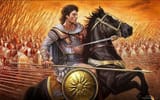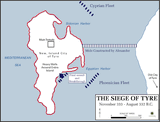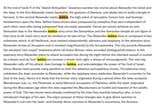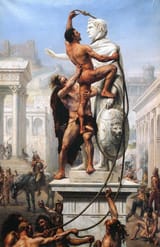>>514707038 (OP)
I find myself more impressed by his father in many respects, Philip II of Macedon. He took a backwater kingdom that just had their king killed, nearly half their army destroyed, surrounded on all sides by stronger entities (Thessaly, Athenians, Illyrians etc.), considered barely Greek at all by the Southern Greeks, and within a single generation had revolutionized warfare (Sarissa, funded the creation of torsion-catapults, invented new logistics, created the companion cavalry and their tactics, revolutionized western siege warfare), brought all his enemies to their heels, and unified Greece becoming the commander and chief (Hegemon). The plan to invade Persia was also his. Philip was just sheer political and military genius.
Alexander was more of a force of nature. Perhaps not the sheer genius and foresight and ability of his father, but just endless ambition and an unrelenting desire for immortality and greatness. Think of it this way: in his time, the greatest warrior was Achilles, only Dionysus had traveled far Eastward. Alexander surpassed the myths and Gods of his time. In his speech at Opis he says he was the first to cross the Indus River since Dionysus.
Someone else mentioned Caesar in this thread, and I also think he was remarkable. Not only arguably the greatest, most accomplished and most experienced military general of antiquity, he was also a first-rate politician, statesman, orator, and a true intellectual (even wrote a book on the Latin language called De Analogia, sadly little survives). Obviously he has his surviving books on the Gallic and Civil Wars.
People like Caesar and Alexander are impressive for having more or less having completely mastered and conquered their world. Stealing a quote from the 2004 Alexander movie (bad movie), their failures tower over other men's successes. Napoleon belongs with them. The common thread I've learned they share is a truly endless energy and ambition. You and I get tired and lazy; they did not.
 9/3/2025, 2:45:08 PM
No.514707038
>>514707084
>>514707129
>>514707171
>>514707328
>>514707546
>>514707946
>>514707985
>>514708043
>>514708079
>>514708180
>>514708319
>>514710703
>>514710924
>>514712317
>>514712740
>>514713421
>>514713614
>>514713843
>>514713877
>>514713992
>>514713996
>>514714112
>>514714574
>>514714700
9/3/2025, 2:45:08 PM
No.514707038
>>514707084
>>514707129
>>514707171
>>514707328
>>514707546
>>514707946
>>514707985
>>514708043
>>514708079
>>514708180
>>514708319
>>514710703
>>514710924
>>514712317
>>514712740
>>514713421
>>514713614
>>514713843
>>514713877
>>514713992
>>514713996
>>514714112
>>514714574
>>514714700








